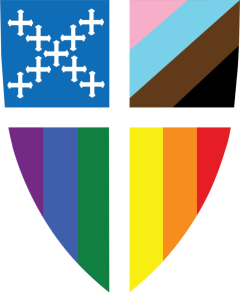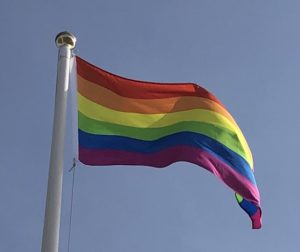Welcoming and Inclusion

LGBTQIA stands for Lesbian, Gay, Bisexual, Transgender, Queer or Questioning, Intersex, and Asexual or Androgynous.
Sexual orientation is one's inherent and enduring emotional, romantic, or sexual attraction to other people. Gender identity is one's innermost concept of self as male, female, a blend of both or neither–how individuals perceive themselves and what they call themselves. One's gender identity can be the same or different from their sex assigned at birth.
Some congregations are interested in taking the important step of learning more about the LGBTQIA community. Others have already followed the process to become "Believe Out Loud" congregations, discerning as congregations to fully welcome and affirm individuals of all sexual orientations and gender identities. Some are ready to begin this process now. Others have begun celebrating same-sex marriages. Wherever you are on your journey, we hope these resources will serve you well in your ministry.
We recognize the work of living more deeply into our faith and widening our circle of welcome is not linear in nature. It is a rich and complex journey of ongoing transformation as we live still more fully our baptismal covenant and welcome our LGBTQIA family members by:
- Seeking and serving Christ in all persons, loving our neighbor as ourselves, and
- Striving for justice and peace among all people, respecting the dignity of every human being.
We Believe that God Loves Us All – No Exceptions.
In the first century, Jesus of Nazareth inspired a new and life-changing movement: a community of people whose lives were centered on Jesus and committed to living God's way of unconditional, unselfish, sacrificial, and redemptive love. As Episcopalians, we believe in a loving, liberating, and life-giving God: Creator, Redeemer and Sustainer. We believe in following the teachings of Jesus the Christ, whose life, death and resurrection saved the world.
We are committed to the vital work of inclusion, aspiring to tell and exemplify God's love for every human being; women and men, gay, straight and trans, serve as bishops, priests and deacons in our church. Lay people and clergy serve together as leaders at all levels of our church. Leadership is a gift from God and can be expressed by all people in our church, regardless of gender, sexual identity, or orientation.
The people of the Episcopal Church in Colorado are committed to the full welcome and inclusion of LGBTQIA siblings in our Church. All over Colorado, welcoming and affirming churches are ready to connect with you. Wherever you are on your spiritual journey, we invite you to join us!
To our lesbian, gay, bisexual, transgender, queer, intersex, and asexual (LGBTQIA) brothers, sisters, and siblings: the Episcopal Church in Colorado welcomes you! Indeed, the whole Episcopal Church welcomes you!
With the help of organizations such as Integrity USA, the church has worked toward full inclusion of LGBTQIA Episcopalians. We are a living example, at every level, of what that full inclusion looks like. The Episcopal Church in Colorado is awash in the colors of the rainbow as we celebrate diversity and pride each and every day!
We believe that God loves us all – no exceptions!
Who Can Help Us in this Work?
Formation Team
We welcome your comments and questions at any time. Please reach out to anyone on the Formation team:
The Rev. Greg Foraker, Canon for Formation and Pastoral Care
Tracy Methe, Missioner for Baptismal Living
Elizabeth Cervasio, Missioner for Children, Youth, and Campus Ministry
Janet Choyce, Event Coordinator
Communications Support, including Websites
Mike Orr, Canon for Communications
Mentors, Coaches, Advisors (LGBTQIA Advocates in the Episcopal Church Colorado)
The Rev. Nancey Johnson-Bookstein, Deacon, St. Brigit's, Frederick
The Rev. Kate Bradsen, Rector, St. Stephen's, Aurora
The Rev. Cynthia Espeseth, Rector, All Saints, Loveland
The Rev. Austin Leininger, Rector, Christ the King, Arvada
The Rev. Tory Moir, Non-Parochial Priest
Bill Oliver, Former Integrity USA Liaison for Colorado, St. Michael the Archangel, Colorado Springs
The Rev. Debbie Shew, Rector, St. Mark's, Durango
The Rev. Dana Solomon, Non-Parochial Priest
The Rev. Bonnie Spencer, Retired Priest
 Resources for Learning and Discovery
Resources for Learning and Discovery
The following resources are organized in an order we hope proves useful–an order of increasing complexity that allows you to delve deeper as you learn about the lives of LGBTQIA people, become knowledgeable about the joys and challenges they experience, and begin to understand the areas congregations may need to address in order to fully welcome them.
Becoming a Welcoming Congregation
What does it mean to be a welcoming congregation? A welcoming congregation welcomes and affirms people of all sexual orientations, gender identities, and gender expressions. We also call these congregations "Believe Out Loud" congregations because they have written and publicly promoted a statement of welcome. The online Believe Out Loud community, a leading platform for Christian faith and LGBTQIA advocacy endorsed by the Episcopal Church, states that "privately believing that LGBTQIA persons should have an equal share in our church and society is not enough; we must publicly proclaim that belief."
Support Organizations
As you embark on your journey of inclusion, keep the following community partners in mind.
Pastoral Resources
The LGBTQIA community faces mental health conditions just like the rest of the population. However, LGBTQIA individuals may experience more negative mental health outcomes due to prejudice and other biases. These resources can assist you in understanding and supporting the mental health of LGBTQIA adults and youth.
